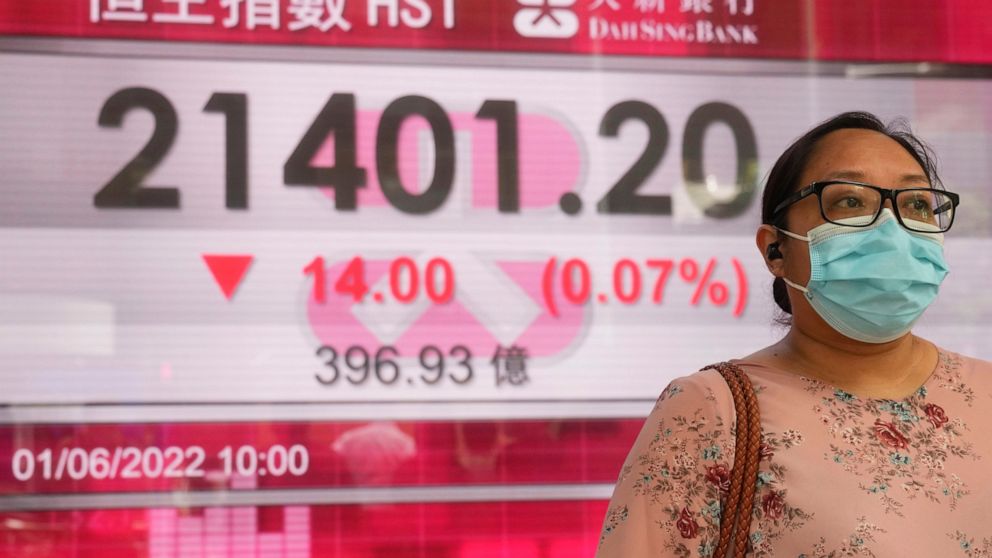World shares mixed after stocks retreat on Wall Street
World shares were mixed Wednesday after a wobbly day on Wall Street closed out a month buffeted by worries about a possible recession, inflation and rising interest rates.
Germany’s DAX gained 0.5% to 14,465.06 and the CAC 40 in Paris advanced 0.5% to 6,497.69. Britain’s FTSE 100 edged 0.2% higher to 7,619.76.
The future for the S&P 500 gained 0.3% and the future for the Dow industrials was up 0.5%.
Traders were keeping a close eye on manufacturing data for Europe and the U.S. due later Wednesday.
Oil prices resumed their upward advance after falling back from nearly $120 per barrel on Tuesday, when prices surged after the European Union agreed to block the majority of oil imports from Russia because of its invasion of Ukraine.
Prices ultimately fell Tuesday on speculation that the OPEC plus cartel of oil producing nations might ease production limits and offset lost oil output from Russia. But as of late Wednesday Asian time, benchmark U.S. crude had climbed $1.57 to $116.24 per barrel in electronic trading on the New York Mercantile Exchange. It closed down 40 cents at $114.67 on Tuesday.
Brent crude, the price basis for international oil trading, picked up $1.50 to $117.10 per barrel.
In Asian trading, Tokyo’s Nikkei 225 advanced 0.7% to 27,457.89 after Japan’s parliament enacted a $21 billion extra budget to tackle soaring fuel and food prices following Russia’s invasion of Ukraine.
The extra budget, for the current fiscal year that started April 1, will fund part of a $48 billion emergency economic package the government adopted in April. It includes subsidies to oil wholesalers to minimize the impact on consumers.
In Sydney, the S&P/ASX rose 0.3% to 7,234.00. The government reported the economy expanded at a 3.2% annualized rate, or 0.8% quarterly rate, in the first quarter of the year.
That was slower than the 3.6% growth in the last quarter of 2021 but still relatively strong, analysts said.
Hong Kong’s Hang Seng fell 0.4% to 21,323.47 and the Shanghai Composite index shed 0.1% to 3,182.16. Both indexes rose sharply on Tuesday as Shanghai eased its stringent anti-virus limits on businesses and other activities.
South Korea’s markets were closed for a holiday.
The jump of more than 50% for oil prices so far this year is a big part of the high inflation sweeping the world. A report Tuesday showed inflation in the 19 countries that use the euro currency hit 8.1% in May, the highest level since records began in 1997.
Through mid-May, the S&P 500 tumbled to seven straight losing weeks for its longest such streak since the dot-com bubble was deflating two decades ago. Slowing data on the U.S. economy has accentuated worries that high inflation will force the Federal Reserve to raise interest rates so aggressively that it will cause a recession.
Stocks have managed to avoid a full-blown bear market, at least so far, with the S&P 500 yet to close more than 20% below its record. Speculation has grown that the Fed may consider a pause in rate hikes at its September meeting.
Beginning Wednesday, the Fed will begin allowing some of the trillions of dollars’ worth of Treasurys and other bonds that it amassed through the pandemic to roll off its balance sheet. Such a move should put upward pressure on longer-term Treasury yields, and it’s one way the Fed is trying to stamp out inflation by slowing the economy.
In other trading, the dollar rose to 129.47 Japanese yen from 128.70 yen on Tuesday. The euro slipped to $1.0724 from $1.0735.
![]()


